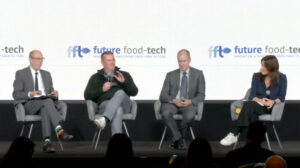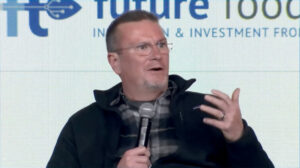We’re in the middle of a “giant experiment” with new ideas and technologies to significantly improve our global food system, a panel shared during a recent discussion at Future Food-Tech San Francisco.
 The panel, “Diversifying the Food System with Novel Foods,” highlighted how technology can move the needle around the world to deliver sustainably sourced alternative foods that are tastier, healthier, and lower in cost.
The panel, “Diversifying the Food System with Novel Foods,” highlighted how technology can move the needle around the world to deliver sustainably sourced alternative foods that are tastier, healthier, and lower in cost.
“We’re at the very beginning of a giant experiment and we’re pushing down all these new paths,” said our CEO, Todd Rands.
Our global food system hasn’t evolved in decades because it had largely succeeded in its initial goal: putting calories into stomachs.
“We’ve been massively successful in creating a system that can deliver as many calories as possible to a growing population,” he said. “And those are World War II era challenges—and mission accomplished!
“We’re living with the consequences of that efficiency and success today. And the problems we’re now faced with involve chronic diseases, and we need to get better at delivering higher quality nutrition, not just the calories.”
Panelists talked about the need to protect the environment from the effects of large-scale agriculture, challenges that are spurring innovation around such tech as gene editing, precision fermentation, molecular farming, and new platforms to produce healthier foods and more sustainable solutions.
Communication plays a crucial role in convincing the world—in a compelling way—that our food system is flawed and there is a better way to deliver nutrition, said Fiona Bennie, managing director, Sustainability Studio for Accenture.

“The message to consumers has to be much different compared with B2B,” Bennie said. “It needs to be about super tasty, exciting, fun, accessible, affordable. It’s only the fast foods today that seem to project fun, and we’ve got to flip the script on that.”
Consumers will continue to make choices around foods they crave, Rands said. “For us, it becomes, ‘how do we create the same experiences, but in healthy, more sustainable forms?’”
Indeed, the panelists discussed that, while calorie needs are not spread evenly around the world, increasing nutrition density is critical, particularly in third world countries.
Rands, who had had a career in the ag business before starting Elo, spent time walking dusty roads in foreign countries and being surprised by what foods would be available.
“There would be no running water, no electricity, and refrigeration is a luxury,” he said. “And at the end of these dusty roads you’d have these kiosks selling potato chips and sugary sodas and cookies. We seem to be able to get those kinds of calories into these distant places.”
The challenge, he added, was about how to bring proper nutrition to shelf-stable products in different parts of the world.
One such example is ensuring that the world’s staple crops that have such a profound effect on diets can evolve and survive. Decades ago, the Gros Michel banana went extinct because of a plant disease—and a similar crisis is unfolding now.
The Cavendish, the most commonly available banana variety, also faces extinction. “It’s hard to think of any part of the world where the Cavendish banana is not part of their diet in terms of nutrition,” Rands said, adding the beloved crop is being wiped out by a fungus and will go away if we don’t act.
 At Elo, we’re acting on it. “We’ve been using (our unique) genetic engineering and gene-editing tools to create a version of this crop that can survive that kind of extinction event,” Rands said.
At Elo, we’re acting on it. “We’ve been using (our unique) genetic engineering and gene-editing tools to create a version of this crop that can survive that kind of extinction event,” Rands said.
But beyond the many innovative startups ready to shake up the system, panelists said it will take strategic partnerships across the board to bring lasting success.
“When I think of molecular farming, and imagine that world in 10 or 15 years, I think of our food company partners like artists,” Rands said. “You’re creating that experience the consumer craves—and it’s an incredibly complex chemical and psychological and processing equation that you’re solving. My job is to give you new colors to paint with.”
In other words, innovation itself.
